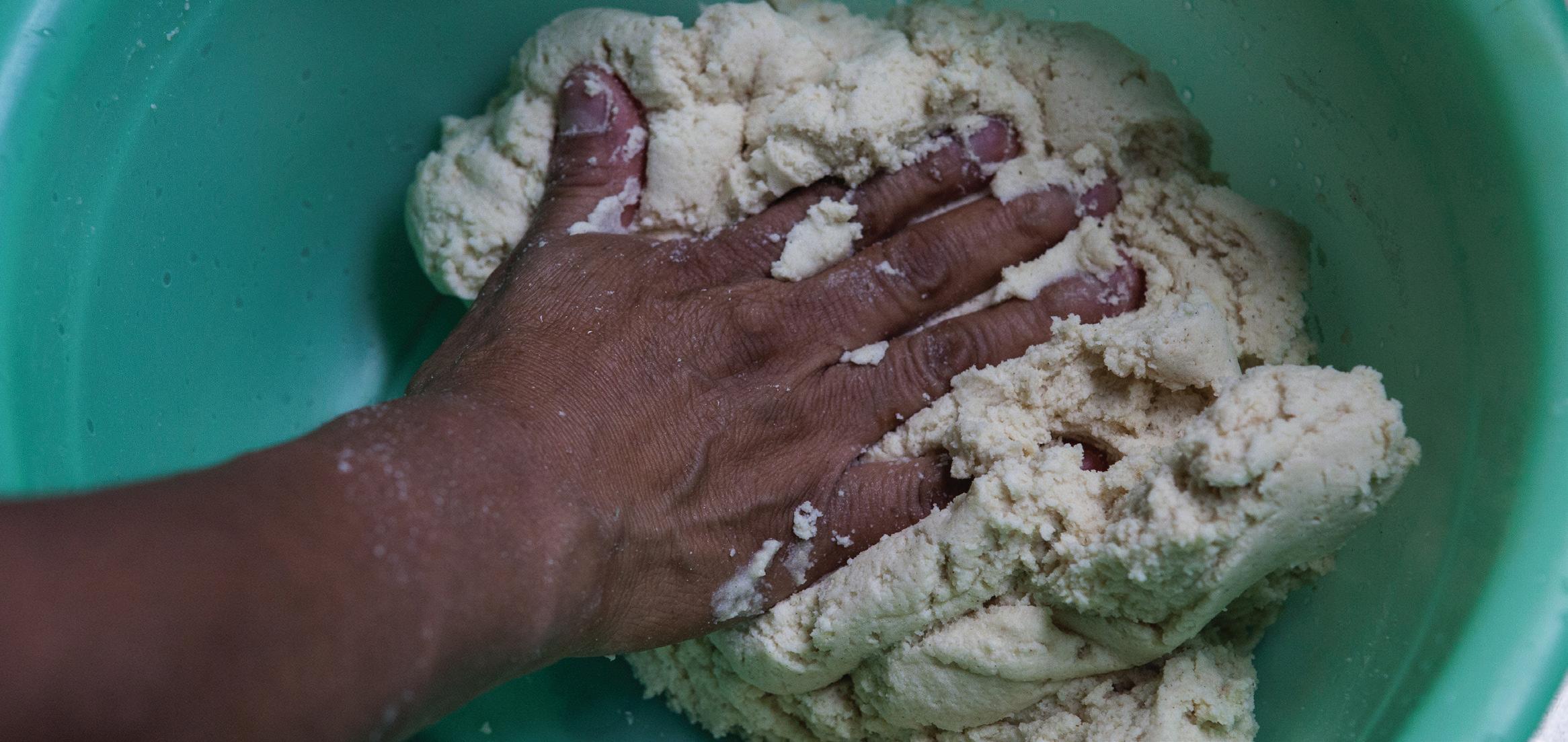
4 minute read
Test
from Demo
Guadalupe Nos Cuenta
CONTRIBUTOR
Victoria Bouloubasis
P H O T O G R A P H E R Peter Eversoll
Victoria Bouloubasis is a journalist, docu
mentary filmmaker and folklorist based in
the South. She explores the intersections of
food, migration, labor and identity.
More at: victoriabouloubasis.com,
@thisfeedsme
Guadalupe toasts peanuts, sesame seeds and pepitas in her home in eastern North Carolina on a summer Sunday afternoon. It’s hot out, the way it always is in July in the South, when the mosquitos get tangled up in the humid, stagnant air before they reach your skin.
In the trailer, the makeshift curtains are drawn, keeping it dark and cool enough for Guadalupe, in a Lycra tank dress, to toil over a rich mole for her guests, my friend Peter and me. Guadalupe’s kitchen is modest. The limited décor includes monsters drawn in crayon, by her eight-year-old son Wilbur, all over the walls and above the stove, and a photograph of her parents in a dusty frame on top of the refrigerator. She brings it down to show it to me; her father had died a couple of weeks before. She has no legal permission to travel, to mourn at home. She is, in a sense, stuck.
With a long, definitive swoop of a pencil, Wilbur finishes the last problem set of his math homework at the kitchen table and scurries out of his seat. He stands up next to Pete, who is nearly six and a half feet tall. Wilbur is eight years old, with a big belly and a shy smile. The spiky hair atop his
round head hits as high as Pete’s hip, which provides a sturdy base for Pete to rest the hefty Canon DSLR camera he’s been holding.
“Take a picture, man,” Pete says, kneeling to meet Wilbur’s eye level and to show him how to cradle the camera in his pudgy hands.
Wilbur grips the Canon with both hands, his finger barely reaching the shutter. The smudgy lenses of his glasses poke the viewfinder as he peers through a tiny, morphed rectangle to watch his mother flip tortillas on the stove. He bobs his head from side-toside with the camera pressed firmly against his face, becoming comfortable with the view.
Pete visits Guadalupe and her two young sons at least monthly as an employee of North Carolina’s migrant education program. His job is to ensure the boys, children of a migrant worker, are getting what they need from school. Today he arrives with a bag filled with notebooks, pencils and erasers, stories, and lastly, a carton of Neapolitan ice cream — our contribution to Sunday supper.

she toasts her mole ingredients. Wilbur waits, as if he’s waiting for just the right light. He looks both professional and miniature behind the lens, the camera resting on the curve of his protruding belly. I hear the prolonged click of the camera’s shutter over the sizzle of seeds popping on a pan.
Wilbur makes straight A’s in math at school. He speaks better English than Spanish. He also speaks better Mam than Spanish, the language indigenous to his mother’s mountain village in Guatemala. They’re here because here, there are jobs.
Guadalupe works the overnight shift at a poultry processing plant. She cuts chicken breasts off of the bone, by hand. Hundreds of them, from 7pm-to-7am. She’s living in this small trailer home with her two boys and two friends.
In the United States, poultry is a $50 billion industry. According to Oxfam, workers process chickens, by hand, using the same motions at least 20,000 times per day. Their research states that “the upper limit on line speed has increased from 70 birds perminute in 1979, to 91 in 1999, to 140 today.” North Carolina is ranked #3 in poultry production, with hundreds of thousands of workers. Many of them
are undocumented, mistreated and underpaid, including reports of injured employees with severed fingers being deported back to Central America.
Guadalupe tells me how her older daughter married very young, barely out of her teens. In telling me this story, I notice a departure from the way she normally speaks Spanish, which is pretty quickly and a bit jumbled. There’s a rising lilt in inflection in a way that perhaps Mam has. But when she speaks of her family left behind — of the parents who no longer walk the hills of her village, of the daughters she talks with almost weekly, but hasn’t embraced in over a decade — Guadalupe slows down. She looks up, anguished, yet composed. It is a look that needs no words, no translation. That maternal gaze riddled with worry.
Wilbur’s laugh snaps her out of it. His glasses and his big belly are pressed against the static of the television screen as he laughs along to an episode of El Chavo Animado, a cartoon version of the classic Mexican comedy series El Chavo del Ocho. At Guadalupe’s urging, he gets up to help me clear the table of his toys and math notebooks. We all sit and eat the decadent beef mole Guadalupe fixed for us and talk about fashion and homework and school.




